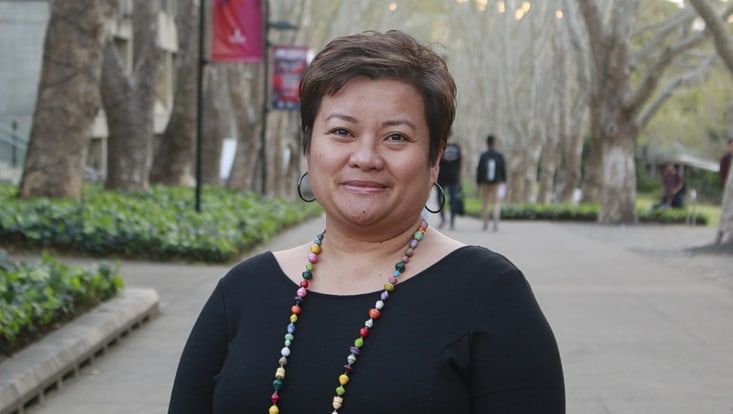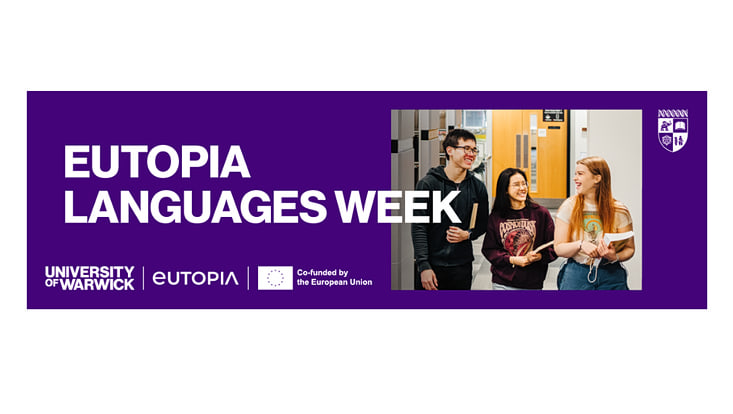Visiting LiDS: An Interview with Sociolinguist Dr. Loy Lising
24. Juni 2025

Foto: Loy Lising
Dr. Loy Lising, Sociolinguist from the Macquarie University (Australia), has been an esteemed guest at our research centre LiDS for the past three months. Her research focuses on multilingualism in diasporic and homeland contexts. Inter alia, it sheds light on heritage language maintenance, language barriers, and solutions that enable full social participation for migrants of languages other than English. In the following interview, she offers insights into her daily life as a guest scholar, discusses her research interests, and shares details about her exciting new projects.
1. Dear Loy, thank you for taking the time for this interview today. The Faculty Research Centre LiDS is delighted to have you as our guest. Could you please tell us a little bit about your current research?
Thank you for having me. I am very grateful to Professor Ingrid Gogolin and Distinguished Professor Ingrid Piller for hosting me here for the three months of my six-month study leave. It has been wonderful meeting and engaging with everyone, especially those from the LiDS Research Centre.
I am a sociolinguist who is interested in multilingualism and social participation. Iinvestigate this intersection with a focus on two strands: language features (micro sociolinguistics) and language use (macro sociolinguistics) of multilinguals in both diasporic and homeland contexts particularly in the domains of family, education, health, and law. Employing both corpus and ethnographic approaches, the three overarching research questions I ask in my research aim to (1) illuminate our understanding of the sociolinguistic factors that encourage/discourage the maintenance of heritage languages; (2) identify the language barriers faced by migrants with languages other than English (LOTE) background and the solutions to these for their full social participation; and (3) map out the linguistic influences of migrant/minority languages on the dominant language and vice versa.
That second research aim, in particular, has been extensively addressed in our recent book Life in a New Language (Piller et.al., 2024). We have also prominently featured the book in Language on the Move where each of the authors share their experiences about this novel collaborative work. In my podcast interview with Brynn Quick, I unpack how language barriers migrants face continue to be underpinned by a monolingual mindset.
At the moment, to further pursue my research aims, I am working on two projects. The first one is a double Special Issue for a Q1 journal focused on multilingualism in the Philippines. Despite the fact that the Philippines is often known for its multilingual ecology, there has not really been a consistent examination into what this multingualism looks like on the ground across different domains as I pointed out in my 2022, 2023, and 2025 papers (all open access). So, I have invited colleagues to do precisely this: empirically investigate what multilingualism looks like across different domains of education, law, politics, online communication, linguistic landscapes, in a rural area, in another major city, in cemeteries, in our attitudes, and in our education practices, historically. To do this, we are employing the concept multilingual mindset (Lising, 2024), which I introduced at last year’s AILA conference, as our framework in discussing our empirical data.
The other is my involvement with Professor Peter Siemund’s Convergence on Dominant Language Constellations (CODILAC) global project, based here in Hamburg University, which investigates English in a multilingual ecology. I am the International Partner for the Philippines, one of the seven countries involved in this project, and we start collecting data this year, which is exciting.
2. Can you give us a little insight into your academic work and describe what a typical day looks like for you here in Hamburg?
There are three kinds of routine that typify what my working day is like here in Hamburg: a LiDS-focused day, a knowledge-sharing day, and a research-writing day.
The LiDS-focused day involves four tasks. First, is usually a meeting with Distinguished Professor Ingrid Piller and Dr Sarah McMonagle to work on our International Research Training Group (IRTG) application. This application is aimed at bringing together colleagues from both Macquarie University and Hamburg University to co-supervise PhD students investigating research problems under the overarching theme of „literacy in diverse settings“. This is usually followed by an online supervision meeting with current postgraduate students who are based at Macquarie University. Third is attending LiDS-organised public talks on multilingualism in society. And this is capped with a social catch-up with LiDS colleagues for dinner, which is a really informal and pleasant way of getting to know colleagues more.
A knowledge-sharing day entails guest-lecturing, sometimes at a nearby university for an invited lecture on my current work. This has mostly been on my recent paper on „multingual mindset“ (mentioned above), and how this can be applied in our research on the intersection of language and migration.
Finally, a research-writing day means working from home and finishing writing tasks I have promised to fulfil during my study leave.
3. How and why did you choose to come to the University of Hamburg?
I choose the University of Hamburg because of the support and my ongoing research relationship with Distinguished Professor Ingrid Piller who has recently moved here after having been awarded the Alexander von Humboldt Professorship. At the same time, my involvement with the Next Generation Literacies Network and my working relationship with Professor Ingrid Gogolin whose life's work is focussed on finding solutions to systemic educational disadvantages for multilinguals and findings ways to use the advantages of multilingualism for successful learning - have also motivated my reason for being here.
An equally important motivation, of course, is the fact that the University of Hamburg is Macquarie University’s strategic partner and spending my study leave here, I hope, contributes to the strengthening of this relationship..
4. Through your work with the Next Generation Literacies Network, you already had close ties to our research centre LiDS. How would you describe your experiences with the research centre LiDS and its work?
It has been really wonderful being part of the LiDS Research Centre and its many activities while being here. The fact that my own research interests align with the research centre’s research goal has truly been inspirational and encouraging. To be able to spend three of the six months of my study leave in a research centre dedicated to topics close to my heart has really been such a privilege.
5. Having been in Hamburg since April, how do you reflect on these past two months in the city?
I arrived in the middle of Spring, which really set the tone for my stay here rather pleasantly: the flowers were starting to bloom; the birds were singing their happy tunes; and the sun was out and happily giving warmth. I often tell my friends I have tropical bones, so you can appreciate how much I appreciated arriving in Hamburg in this season. And because this is only my second time in Germany, and the first time that I can stay at length, it has given me a wonderful opportunity to appreciate the architecture, the culture, and the people in addition to all the research work I can accomplish. So, overall, my stay here has definitely achieved what a study leave/outside studies program (OSP) is intended to do. It provided me space to focus on my research. It gave me a platform to interact with like-minded scholars, not only for knowledge sharing but also to pursue further research collaboration. It inspired and extended my own thinking through the many (in)formal interactions with colleagues at the LiDS Research Centre and other universities that I have had the privilege to visit. I can only hope, of course, that in these interactions I have represented Macquarie University well.
References
Lising, Loy (2025). Global English in multilingual Philippines. In P. Siemund, G. Stein, and M. Vida-Mannl (Eds.), World Englishes in their local multilingual environments, pp 91-115. Amsterdam: John Benjamins. https://benjamins.com/catalog/hsld.9.05lis
Lising, Loy (2024). Multilingual Mindset: A necessary concept for fostering inclusive multilingualism in Migrant societies. AILA Review 37(1), pp. 35-53. https://benjamins.com/catalog/aila.23023.lis
Lising, Loy (2023). Multilingualism. In A. Borlongan (Ed.), Philippine English: Development, Structure and Sociology of English in the Philippines, pp 242-256. Routledge. https://doi.org/10.4324/9780429427824
Lising, Loy and Bautista, Maria Lourdes (2022). A tale of language ownership and identity in a multilingual society: Revisiting functional nativeness. Journal of English and Applied Linguistics 1(1), pp.1-14. https://doi.org/10.59588/2961-3094.1000
Piller, Ingrid, Butorac, Donna, Farrell, Emily, Lising, Loy, Motaghi-Tabari, Shiva, Tetteh, Vera Williams (2024). Life in a new language. New York: Oxford University Press. https://global.oup.com/academic/product/life-in-a-new-language-9780190084295?q=piller&lang=en&cc=us
The interview was conducted by Larissa Cosyns.


